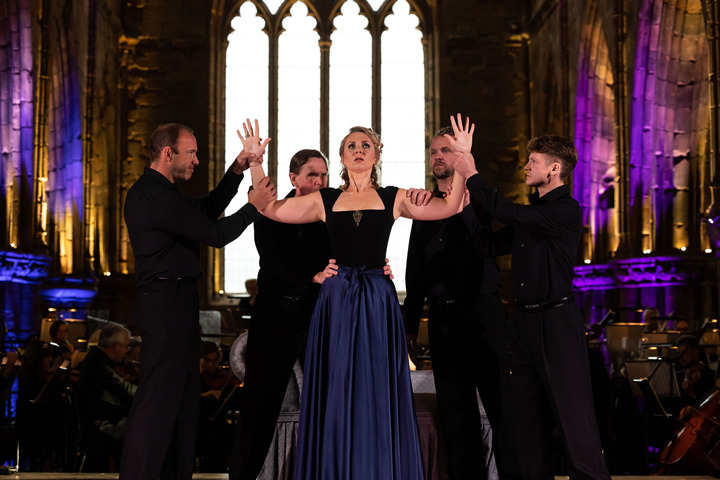| Opera Reviews | 29 April 2024 |
Justina Gringyte is a powerful Thérèseby Catriona Graham |
|
Massenet: Thérèse |
|
 |
|
|
In a way, it was fitting that Scottish Opera’s concert performance of Massenet’s Thérèse was preceded by a minute’s silence and a rousing rendition of the National Anthem. The opera is set in turbulent times of regime change, a time of uncertainty, and yet it is utterly domestic. Its characters are not the regime changers, they are caught up in something they think they understand, but find out they don’t. Thérèse is married to André, a Girondist, and lives in the chateau formerly belonging to Armand, a Marquis, with whom André grew up, so he has happy memories of it. Only, Thérèse has her own memories of the very stone bench which is the only bit of scenery in the first act. She was in love with Armand, who had begged her to flee with him. As André, Dingle Yandell is very much the straight guy - open, upfront and in love with, but a bit worried about, Thérèse. In response, Justina Gringyte is highly emotional, her rich mezzo voice ranging from sweetness to anguish, reflecting the extent to which she is conflicted. They have more a sung conversation than a duet before he goes, leaving Thérèse to pour out more anguish and let us know of her love for the departed Armand – who promptly sneaks back. Shengzhi Ren’s aria on the impossibility of forgetting their love is accompanied by harpsichord and orchestra with a delicate sensuousness. When André walks back in on them, Yandell audibly is overjoyed to see Armand. Once in Paris, Thérèse pours out a paean to the countryside, which is interrupted by André – now Yandell conveys a degree of self-righteousness, as he sings of Friendship and Liberty. As the mood of the mob in the street changes, the singing of Gringyte and Ren is highly charged with emotion, and is a superb example of two people each so caught up in their individual feelings that they are blind to the other. Thérèse is torn between what she designates as ‘grim duty’ and her love for Armand, who is impervious to the concept that she wants him to leave to live. As the situation deteriorates, and she learns that André has been arrested, Gringyte becomes even more intense and, in the final passage, when singing is replaced by rhythmic speech, she embraces certain death as a resolution to her dilemma. The orchestral music is pretty intense too, and conductor Alexandra Cravero wrings it out of the players. In places, the harps are plucking at the heart strings, in others surging waves of sound replicate the surging emotions of the singers. Such is the emotional intensity, Roxana Haines’ minimal staging is sufficient – the men in the chorus have a bit of by-play in the opening chorus and the minor roles need do little more than sing their piece. In this case, less is most definitely more, in not distracting from the power of Gringyte’s portrayal. |
|
Photo © Sally Jubb Photography |
|







